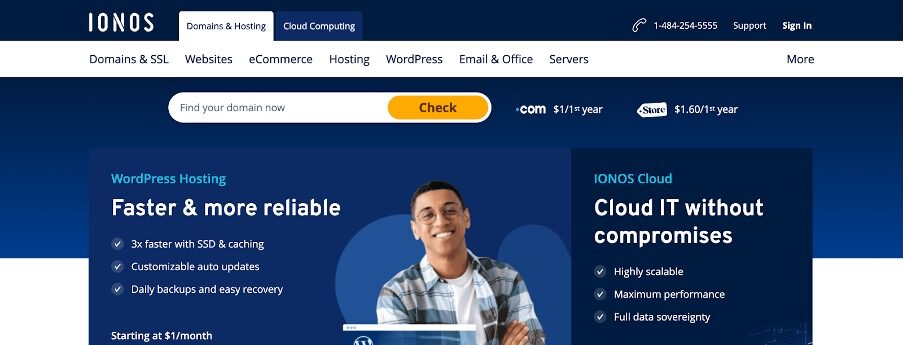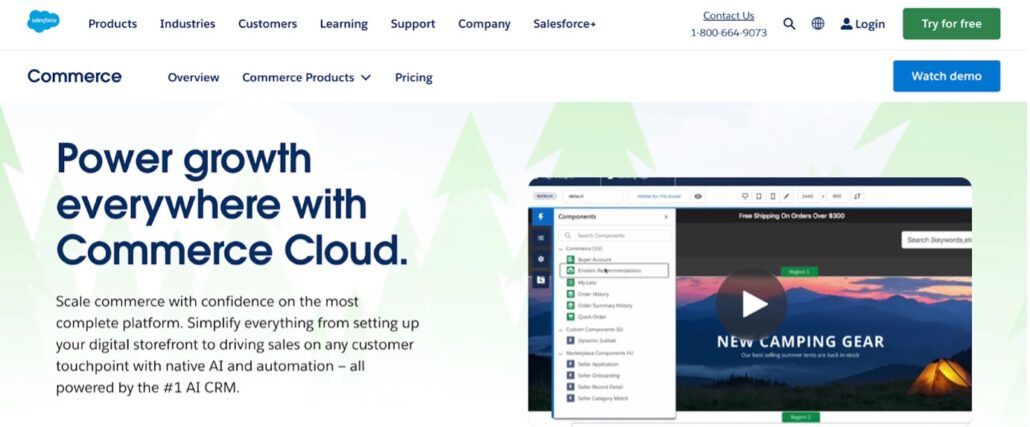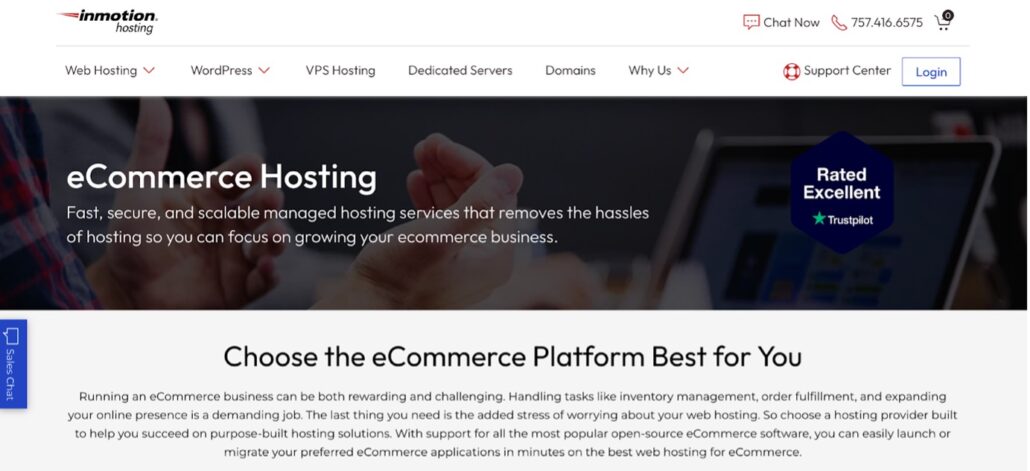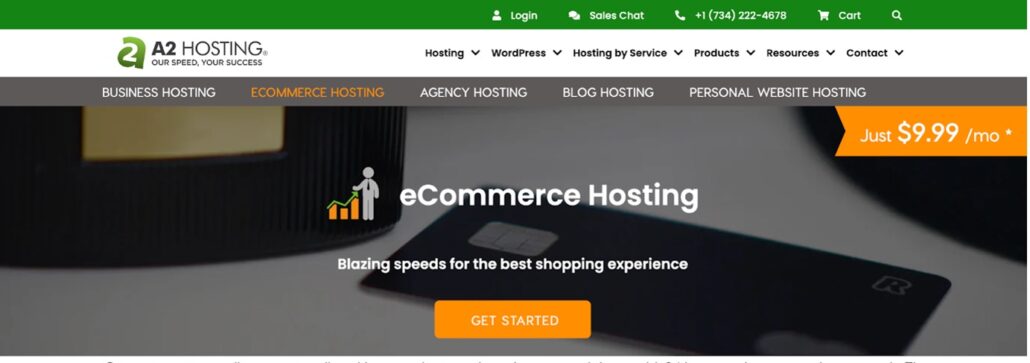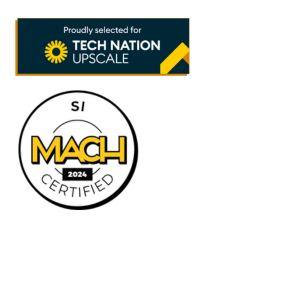Table of Contents
Nevertheless, the ideal web hosting for eCommerce providers should be robust, scalable, reliable, and secure. In addition, they should have tools and features tailored to the needs of eCommerce businesses. The best services deliver the essentials, such as minimal downtime, high-quality security, and high speeds. However, they also feature out-of-the-box integrations with leading eCommerce platforms and customer support. Importantly, they need to match your budget.
With that in mind, what does a good eCommerce hosting provider look like? In this blog, we’ll look at some of the best examples on the market. Our list of eCommerce web hosting services will give you everything you need to deliver high-quality and secure eCommerce experiences.
Things to consider when choosing an eCommerce hosting service
Before diving into the best ecommerce web hosting sites, it’s essential to do your research. Simply typing in ‘best hosting for eCommerce’ into a search engine will provide you with millions of results. Instead, take a step back and consider these factors:
Consider your business goals
First, let’s talk about the most essential factor: your business! As we’ll explore later, each solution has its nuances. Typically, the best web hosting services for eCommerce will have overlapping features, but they’re not all the same.
Infrastructure
You have to choose a hosting service that integrates with your existing infrastructure. Doing so ensures your platform grows from strength to strength. Naturally, you want as little disruption as possible.
You need to consider the strength of your internal development teams. Do they have the skill set to handle a more complex migration? If not, consider hiring additional staff or providing extra training. Alternatively, choose a web hosting service offering lots of customer support. However, if you have an experienced team, you can cut costs using a hosting service you don’t have to depend on as much.
Nevertheless, the more complex integrations will have improved tools and features, so while it is a costly option in the short term, you’ll reap the benefits over time.
Budget and Cost
When making a final choice, your budget will always play a part. It’s important to note the most expensive solution doesn’t make it the best solution for your business. Web hosting for eCommerce doesn’t work like that, as there are too many variables at work. Some options work out cheaper in the long term, especially if you’re an ambitious business looking to grow.
Before you do your research, make a list of requirements and optional extras. This will allow you to go into your research with a narrow focus, helping to keep the costs down.
Ecommerce hosting: essential criteria
Here are some key factors you should look for when selecting a hosting service.
Reliability & Up-time
You need to make sure your eCommerce store is online and accessible at all times. Little-to-no downtime means your doors are always open to customers so that you won’t miss out on potential sales. For instance, one minute of downtime would cost WalMart.com over $40 thousand in revenue.
Security
Any eCommerce hosting service worth its salt must offer the following:
- Secure Sockets Layer (SSL) certificates
- Two-factor authentication
- Encryption
- PCI DSS compliant
- DDoS protection (firewalls, etc.)
- Secure payment gateways
- Regular backups
Customer Support
If you run into any problems, you want to make sure your hosting provider is easy to get in touch with.
The level of customer support varies depending on the platform type. For example, SaaS platforms are likelier to include IT support from the get-go. Nevertheless, levels of support differ from a direct line to a support team, communicated via a chatbot, or submitting a ticket and waiting in a queue.
Page Load Speed
40% of desktop users will leave a web page if it takes longer than 3 seconds to load. If your site is active and responsive, you can avoid losing customers. Ecommerce websites host lots of videos, images, and other digital assets. So, your host must provide you with the bandwidth to facilitate product experiences aligning with eCommerce best practices.
In addition, site speeds are also crucial for eCommerce SEO—search engines (Google, Bing) direct browsers to websites with high-quality customer experiences. Consequently, page load speed needs to be a priority.
When compiling your shortlist, make sure to check the bandwidth. If the budget allows, go with unlimited bandwidth.
Blog
Mastering the Challenges of Omnichannel Retailing
Bridge the Gap Between Online and Offline
What is eCommerce Web Hosting?
At the very top level, web hosting for eCommerce involves a company lending your online business space on its server to run your eCommerce business. This involves storing text, images, and code to make your online store accessible to shoppers via online browsers. In other words, eCommerce hosting provides the required services for an online store to function.
Moreover, what sets eCommerce web hosting apart from ‘traditional’ web hosting is the best hosting for eCommerce sites contains additional functionality and features to facilitate eCommerce. Ecommerce hosting websites have different specialties, including:
- Secure payment processing
- Shopping cart integration
- Optimized performance
- 24/7 support
- Ecommerce software integration (WooCommerce, Shopify, etc.)
May hosting providers specialize in various niches. So, it’s essential to identify those adept at eCommerce hosting site web services to ensure optimal performance.
Ecommerce Hosting Options
Once you’ve established a budget and goals, it’s essential to understand the differences between different eCommerce hosting options. As with ‘normal’ web hosting, there are a variety of options to choose from to power your eCommerce platform.
Nevertheless, each type of hosting comes with strengths and weaknesses:
Software as a Service (SaaS) |
SaaS options are typically built on a cloud-based infrastructure provided by a vendor. This means there’s little need for local server setup or maintenance. As it’s hosted on remote servers, you can count on high uptime.
This is the easiest option if you have limited IT knowledge, as the vendor handles maintenance. In terms of security, SSL certificates are usually included by default. |
Headless |
Headless hosting services allow for increased customization. This is because the front end and back end of your eCommerce website are split.
Decoupled architecture and API-driven development allow you to scale your business to handle high traffic and increased processing demands. However, headless hosting is complex. It can also be expensive to set up and maintain, as it requires ongoing investments across the front end and back end. |
Infrastructure as a Service (IaaS) |
IaaS is a cloud computing model offering virtual resources (servers, storage) through the Internet. It’s a cost-effective solution that doesn’t require investment in lots of hardware.
It’s usually quick to get off the ground as you can launch new virtual machines and storage in minutes. However, if it’s not configured correctly, it can be vulnerable. |
Self-hosting Options
Self-hosting provides you with greater flexibility. Typically, self-hosting providers will have tiered packages, with prices dependent on the size of your store (and the features you want to include). Self-hosting provides your business with control and customization, allowing you to modify any aspect of the store as you see fit.
Here’s a breakdown of the common options in order of quality:
Shared Hosting |
Shared hosting plans are a great way to save money. In a shared hosting setup, multiple customers manage their respective eCommerce sites on a single server.
However, if one site has a sudden increase in traffic, this could cause other sites to experience problems. Shared hosting is good if you’re starting. In the long term, it’s not the best solution |
Virtual Private Server (VPS) Hosting |
VPS hosting is similar to shared hosting. However, each eCommerce site on each server receives a strict set of resources that they can use.
This way, you won’t encounter problems if other sites on the server are experiencing spikes in traffic. So, VPS hosting is more dependable than shared servers. |
Dedicated Server |
Unlike shared and VPS, the only site on the server is your own.
Once your eCommerce is running up thousands of customers, consider upgrading to a dedicated server from a VPS. |
That being said, self-hosting can get expensive. As your business grows and develops, you’ll quickly burn through pricing tiers. In addition, setting up and maintaining self-hosted eCommerce solutions can be tricky. In this scenario, it’s wise to have a strong IT team.
6 Best Hosting Providers for eCommerce
Choosing the best hosting for eCommerce websites is a business-critical decision. Below, we break down some of the best choices on the market.
1. BigCommerce

No stranger to eCommerce, BigCommerce provides a powerful hosting solution as part of their eCommerce platform.
BigCommerce is one of the best eCommerce hosting providers. As a SaaS solution, BigCommerce takes care of the maintenance and security, giving you time to grow your business.
- Enterprise-grade speed
- 100% uptime during Cyber Week since 2016
- Certified Tier 1 security and compliance
- User-friendly interface
G2 Rating: 4.2/5
2. IONOS
IONOS provides different packages for eCommerce stores, giving you everything you need to manage and maintain your store. Their most advanced features come with features such as:
- Daily backups with quick recovery
- 24/7 support
- Advanced product SEO
- SSL, DDoS protection
- Powerful analytics
- 1.23 second page load time
IONOS is primarily an Infrastructure as a Service (IaaS) and web hosting solution, so you’ll have to play a more significant role in managing and maintaining the website. However, if you have the knowledge, IONOS will be a great eCommerce hosting solution for your business.
G2 Rating: 4.2/5
3. Salesforce Commerce Cloud (B2C)
As with BigCommerce, Salesforce Commerce Cloud is a SaaS-based solution. With a diverse client portfolio – including Ralph Lauren and Adidas – Salesforce’s ecommerce platform eliminates the need for 3rd party web hosting. Instead, the Salesforce team manages the technical aspects.
- 99.99% uptime
- Strong security features
- Cloud-hosted architecture
- SFCC manages the platform
- 5-star customer support
G2 Rating: 4.2/5
4. InMotion Hosting
Whether you’re a small business or enterprise, InMotion hosting comes with the tools to host a successful online store.
InMotion is an excellent hosting service if you use open-source eCommerce platforms (WooCommerce, Drupal, Magento) to power your eCommerce store.
- 99.99% uptime
- Easy 1-click installer
- SSL and a custom firewall
- Comprehensive security monitoring
- 90-day money-back guarantee
- 24/7 supported, based in the USA
G2 Rating: 4/5
5. Shopify
In the US, nearly one in three online businesses use Shopify to run their eCommerce store. As with BigCommerce, Shopify doesn’t require you to update and maintain the platform. Instead, any bugs, updates, and downtime are all taken care of by Shopify.
- Level 1 PCI compliance
- SSL certificate
- Unlimited bandwidth
- Quick server speed
- Hassle-free updates
G2 Rating: 4.4/5
6. A2 Hosting
If you’re looking for shared hosting, VPS hosting, dedicated hosting, or reseller hosting, A2 Hosting has many packages suitable for eCommerce businesses. A2 Hosting specializes in Virtual Private Server (VPS) hosting, offering high-quality performance and customization. However, there’s a steep learning cursive, and maintenance can be tricky.
Some of the benefits of hosting through A2 Hosting include:
- 20x faster page load speeds
- 40% faster CPU performance
- Enhanced security and free SSL certificates
G2 Rating: 4.4/5
Best Web Hosting for Small Business eCommerce
A high-quality eCommerce website will help attract traffic, enhance your online presence, and drive sales. However, with lots of options and plans on the market, it’s hard to choose.
For smaller businesses, choosing the best web hosting site for eCommerce can be tricky. You need to be even more savvy about your choice. First and foremost, if your eCommerce platform already offers web hosting and hits critical criteria (SSL certificates, quick page load speed, etc), then there shouldn’t have to be a reason to look elsewhere. However, this isn’t always the case.
Moreover, smaller businesses don’t have the budget of enterprise companies. In addition, smaller businesses need to ensure the choice they go with is future-proof, allowing them to scale in the long term. Any mistakes when choosing the best hosting service can be costly. It’s essential to get it right the first time.
Look for the best web hosting for eCommerce sites to improve user experience, site performance, and (eventually!) sales conversions. As smaller businesses are often up against major players in the industry, standing out is imperative.
SMB eCommerce Hosting Solutions
Below is a selection of solid choices for small, value-focused businesses in the market for a high-performing eCommerce hosting web solution:
- A2 Hosting: Their second appearance in this blog! A great all-round solution.
- SiteGround: Another great all-around hosting company offering multiple packages for small businesses.
- BlueHost: If you’re looking for an option with excellent support features, this is your go-to choice.
- HostGator: Consistently reports high-quality uptime performance
- DreamHost: Feature-rich to give you the extra edge in a crowded market.
- InMotion: Another to feature twice in this blog, InMotion offers a range of VPS options if you want to get started.
- TMD Hosting: Fast-page speed and one-click integration to your eCommerce platform
- Pressable: Hassle-free integration with platforms such as WooCommerce.
- Cloudway: An excellent option for cloud-based hosting.

